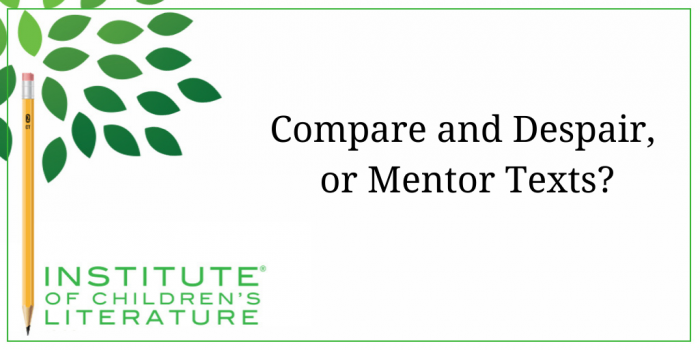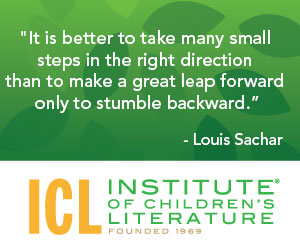1000 N. West Street #1200, Wilmington, DE 19801
© 2024 Direct Learning Systems, Inc. All rights reserved.

We teach our students how to write and get published!
View our Course Catalog >

Some book publishers are now specifically asking writers to look at competing books when sending in manuscript submissions, partial submissions, queries, or book proposals. And this request can seem overwhelming if it’s the first time you’ve ever done it. But while you must compare, do not despair! These books will be your mentors. Your mentor texts. Ask yourself, what books are competing with mine? And, am I competing with all the other books in the genre? Only books with very specific elements like mine? Somewhere in between?
Let’s look at analyzing the competition.
Look At Your Book First
When you’re examining your book to decide how it stands in the general marketplace, ask yourself: why would a reader benefit from my book or why would a reader want to read this specific book? For example, imagine you’ve written a picture book where each turn of the page is a look at a different animal mother tucking her babies in to sleep. So why might someone choose this book? First, it might be a good bedtime read. So you’ll be comparing your book to all the bedtime reads. But what else is specific about it? Maybe you’ve researched how baby animals sleep. Some sleep in nests, some in caves, some snuggled against (or under) their mothers. And your book reflects all these interesting ways young animals sleep, so your book reflects research and accurate information about mother and baby animals. Make a checklist of other very specific things that are true of your book. Does it rhyme? Is it short or long in word count? List everything that is specifically true of your book. (And yes, I have seen submissions guidelines that even ask for market comparisons in picture books,)
Take Your List on a Hunt
The second thing to do in preparing your market comparison is to treat your list like a checklist. You’re looking for books that share as many similarities to your checklist as you can find. One good place to start this search is Amazon because this online bookseller works much like a “Books in Print” with a search function to help you find similar books. When I carried my imaginary book list to Amazon and type “bedtime baby animals” into the search engine (after specifying “books” in the dropdown menu), I find lots of books that might be a little like my imaginary book. In fact, at first glance, I might despair. There are so many books just like mine! But I calm down and keep looking.
Imagine that this imaginary picture book is your book. You’re looking for other picture books that combine bedtime books with specific nature information. That’s going to definitely be a smaller pool of books than if you tried to look at all published picture books with animals in them at all. So, you examine the search results on Amazon. Perhaps you find Bedtime in the Meadow which shows animals going to bed, but doesn’t necessarily focus on mother/baby interaction. Perhaps you find Night-Night, Forest Friends but quickly see the bedtime scenes in that book aren’t nearly as realistic as the ones you’ve created.
The more books you compare, the more you can see the very specific ways your book stands out among the competition. Make note of those books most like yours and the ways in which yours is different.
Oh No, I Found a Book Just Like Mine!
First, yes, there will be books like yours. If there are absolutely no books that bare similarities to yours, you’d actually have a problem. Booksellers don’t really like to stock books when they don’t know how to categorize them. Publicity departments don’t like to promote books when they don’t know how to tie it into anything popular. So the fact that there are books with similarities to yours is not bad. You want that to happen.
Second, the similarities may seem alarming at first, but if you find a book that seems (at first glance) to be very similar to yours, you’ll probably want to see an actual copy of that book. (You may find a copy in the library or via interlibrary loan, or you may decide to buy one). In almost every case, once you read the book, differences will begin to jump out at you. For instance, there were many books with mother animals and baby animals going to bed. If I stopped at that point, I would be sure no one would buy another book where baby animals are settled down to sleep. But if I spend more time looking at the individual books, I begin to see all the ways they differ from one another and then the ways they differ from my mythical book.
Write Up Your Findings
When you’re writing up your findings, there are two things to keep in mind. First, you want to be honest. If the publisher goes looking for competition and finds you played down the similarities too much, you’ll lose credibility. But you are trying to sell your book, so you want to make the ways in which yours is unique sound as good as possible.
Let’s consider our imaginary bedtime picture book. After my search, I find that no one seems to have gone to much effort to present accurate animal information. So the accuracy of my information is something I’ll want to really play up. “With the focus today on STEM education and science accuracy, parents of young children will find the accuracy of the animal information particularly appealing. My book doesn’t include oversimplifications that the child will need to ‘unlearn’ later.”
While comparing books, I want to also play on the popular elements of my book, even though it might be something that is found in a lot of books. So my opening might mention the popularity of picture books with warm, bedtime routines. In fact, I might even mention the role of warm bedtime routines in smooth transitions to bed for young children:
“Psychologists agree that a warm, loving bedtime routine helps both child and parent unwind. Parents have clearly found this to be true, as there are a number of popular picture books focusing on bedtime routines. My book will include those warm connections, making it fit right into the bedtime routines taking place in households all across the country, but mine brings something extra: effortless learning about animals.”
Summing Up
When you write your market comparison, you will need to do three things:
1. Show that you know where your specific book fits in terms of format and genre.
2. Show that your book will be part of a popular trend in some way, if possible.
3. Show that your book will be unique in some positive way.
If I do those three things, I’m going to not only show the publisher that my book is a good investment, I’m going to show possible marketing points. This market analysis does take time, but it shouldn’t be arduous. In fact, it can even be fun, especially if you imagine your book snuggled in amongst all those others, just waiting for a chance to go home with an eager reader. Just remember to take your time, be accurate, and don’t freak out and I’m sure you’ll do just fine.
With over 100 books in publication, Jan Fields writes both chapter books for children and mystery novels for adults. She’s also known for a variety of experiences teaching writing, from one session SCBWI events to lengthier Highlights Foundation workshops to these blog posts for the Institute of Children’s Literature. As a former ICL instructor, Jan enjoys equipping writers for success in whatever way she can.
1000 N. West Street #1200, Wilmington, DE 19801
© 2024 Direct Learning Systems, Inc. All rights reserved.
1000 N. West Street #1200, Wilmington, DE 19801
© 2024 Direct Learning Systems, Inc. All rights reserved.
1000 N. West Street #1200, Wilmington, DE 19801
© 2024 Direct Learning Systems, Inc. All rights reserved.